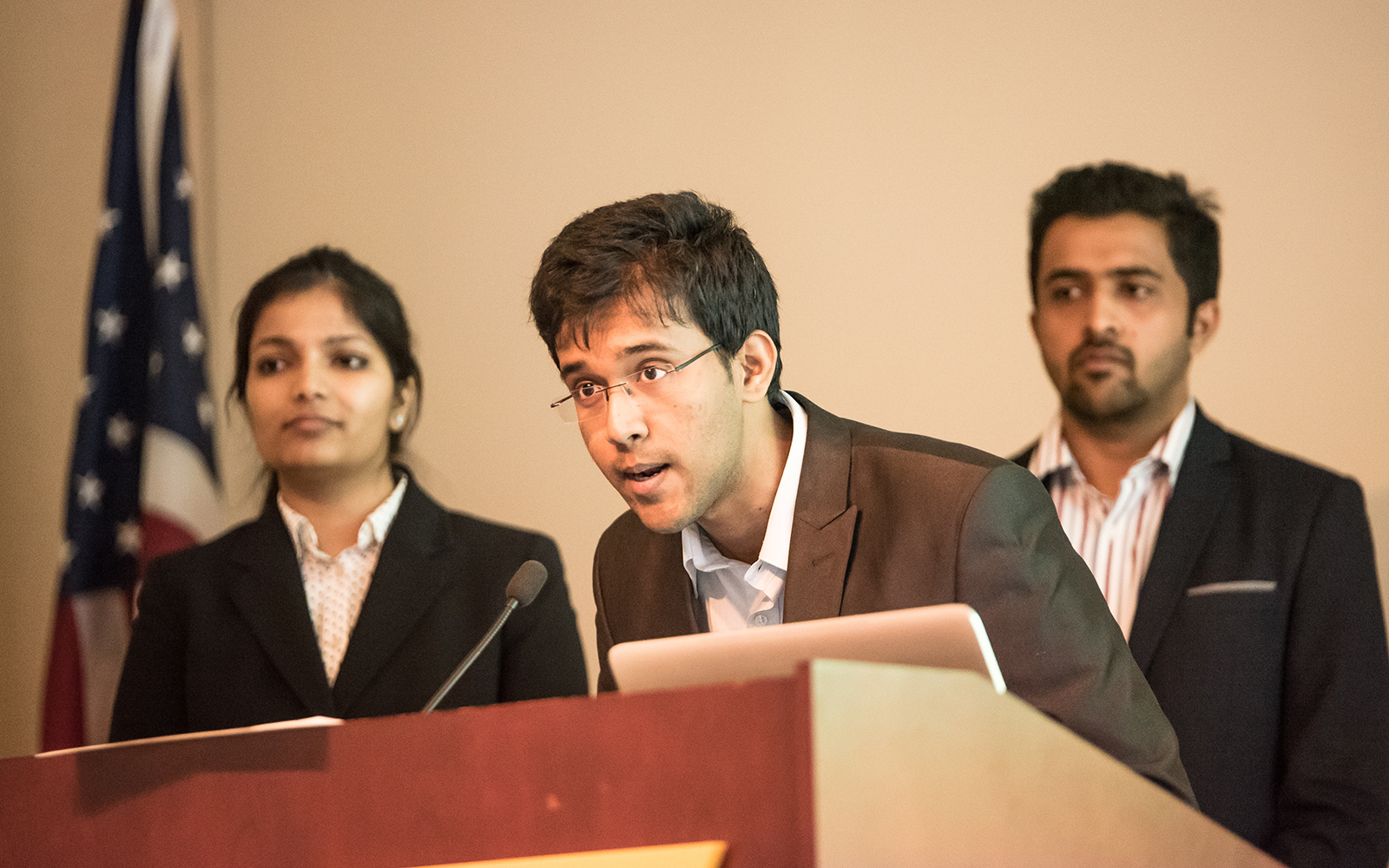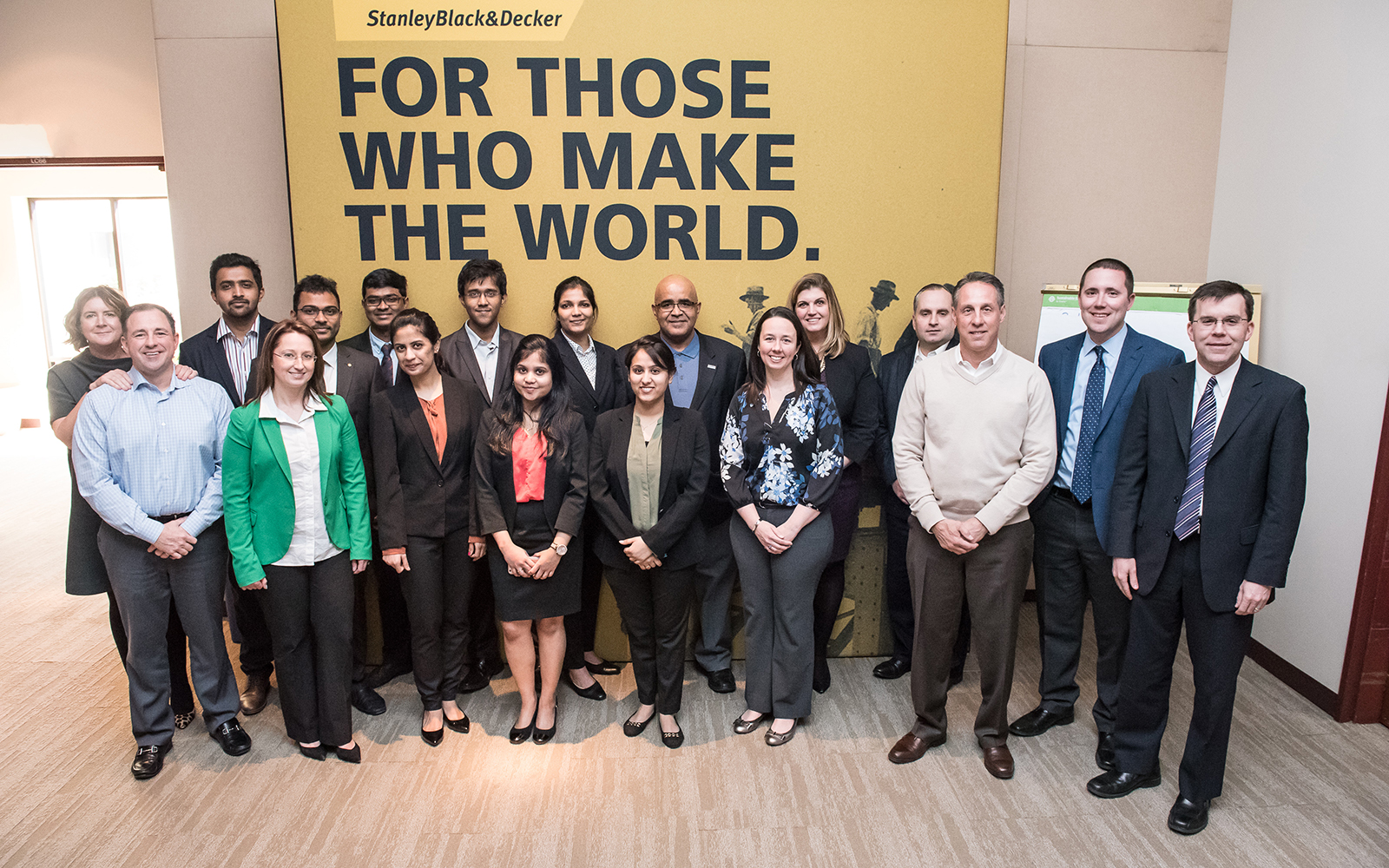
UConn MSBAPM Students Help Stanley Black & Decker ‘Nail Down’ Its Data Analytics Info
Stanley Black & Decker executives wanted to optimize their vast repository of data from their Healthcare division, but were hampered because reports came from four different information systems.
If they were able to capture more unified and robust data, they could identify spending patterns that would allow them to redeploy inefficiencies and foster growth initiatives.
Recognizing that the process had become too cumbersome, Joe Radziewicz, vice president of internal audit, Doug Dentler, Stanley Healthcare CFO, and other Stanley executives, turned to UConn graduate students for help.
They presented them with a challenge: create a new dashboard—one that is fast, efficient and easy to use, and will allow managers to analyze information and track potential cost savings. More than 80 students, all studying for a master’s degree in business analytics and project management, took on the challenge.
“The UConn students showed great mastery in data analytics and a passion for that science. They were curious, excited and thought ‘outside the box,'” Radziewicz said.

“We were able to leverage the UConn students’ expertise to develop a visualization technology to capture important data and the types of expenses that we are incurring, and to analyze trends. Our ultimate goal is to eliminate wasteful spending,” he said. That savings can be reinvested into innovation for customers, digital technologies and other growth initiatives, he said.
The project began in December and is now in the final stages. Stanley Black & Decker is working with the students to take the best of all the ideas and incorporate them into a final platform.
In the case challenge, the team of Sravanthi Kappuram and Sarath Mandava took first place and a $1,000 prize. Second place, and a $600 award, was given to Ravi Gurram, Aditi Aditi and Shweta Ikhe. The third-place team, recipients of a $400 prize, included members Suhas Nadiga, Karpagam Vinayagam, and Anoop Ramathirtha.
“The final teams were chosen based on their ability to drill down and obtain data in different ways. We also looked for user-friendly approaches to data collection,” Radziewicz said.
CABA Fulfilling Its Mission to Advance Education, Business
This is among the first big projects for the School of Business’ new Center for the Advancement of Business Analytics (CABA), which is designed to be a hub for business analytics and data science, serving both educational and business needs. Professor John Wilson is the center director.
“We are one of the pioneers in graduate-level education in analytics,” said Ram Gopal, department head for Operations and Information Management (OPIM), noting that some 400 students are enrolled in the UConn program in Hartford and Stamford.
“We were one of the early programs in the U.S., and have developed a very strong reputation. Our curriculum is at the cutting edge, and we are constantly revamping it to bring state-of-the-art techniques. We engage well with our corporate partners with capstone projects and data challenges. The Stanley Black & Decker competition is a great reflection of that.”
“Analytics experts are among the most in-demand in the country and it is a field that will continue to grow into the foreseeable future,” Gopal said. “Data-based decision making is developing deep roots. We prepare students to be well-equipped with analytics and big data assessment.”
LIMRA, a 100-year-old trade organization serving the life insurance and financial services fields, was the original CABA partner. Robert Kerzner, LIMRA’s CEO, said he sees a growing importance for businesses to leverage their analytics and data science capacity.
“Working with the University of Connecticut, we hope to help our members advance their individual data analytics initiatives, as well as develop projects that could benefit the industry as a whole,” he said. Other partners include Tableau software and Stanley Black & Decker.
For Students: Real Company, Real Impact
“It is so exciting that with CABA we are able to bring these real-world business projects to our students where they can gain valuable experience putting their analytics skills into practice,” said Professor Jennifer Eigo. “And the data visualizations from the winning teams will have an immediate impact for Stanley Black & Decker.”
For Mandava, the project boosted his confidence as he seeks employment. “I will always remember the reaction of the clearly impressed judges during our presentation,” he said. “With the reaction we got, it is safe to say our dashboard had a real impact!”
Gurram, who devoted 150 hours to the challenge, said overcoming Stanley’s data project allowed him to accomplish more than ever before, including learning how to look at a project through the eyes of future dashboard users.
“Doing a project for a real company, with real impact, will be a great selling point for me moving forward,” he said.
Kappuram said the initial stages were very difficult, especially trying to understand the data, addressing some parameters and making sure the plan was complete. “I’ve talked about my experience and challenges in several interviews, and I’m sure it will stand out as one of my significant technical achievements,” she said.
Radziewicz, from Stanley Black & Decker, said the company is humbled to have been able to partner with such expertise.
“In business, there is tight competition for students who have this new skill set,” Radziewicz said. “We’re fortunate to have a great resource in Connecticut that we can leverage.”
“For UConn, the students, and Stanley Black & Decker, this is a win-win-win,” he said. “The students get experience with and exposure to a Fortune 500 company, the University’s curriculum is supplemented with real-life business cases and data sets, and Stanley gets access to a great talent pipeline and support for projects that benefit our community.”